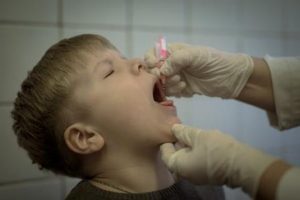
A team of technical experts assessed Ukraine’s response to a polio outbreak and concluded that transmission of poliovirus has been interrupted. Nevertheless, the team remains concerned about significant gaps in immunization and surveillance that put Ukraine at high risk for new outbreaks.
“Thanks to the efforts of the Ministry of Health, health workers and parents, many more children are vaccinated against polio, and I commend them for their commitment,” said Dr Zsuzsanna Jakab, WHO Regional Director for Europe. “But these efforts do not stop now. The immunization gap persists and, if Ukraine does not continue vaccinating its children, this gap will expand for polio and other vaccine-preventable diseases to strike.”
High routine immunization coverage
Owing to low coverage, immunization gaps accumulated in Ukraine; it interrupted polio transmission with a campaign of three rounds of catch-up vaccination. High routine immunization coverage is a top priority for WHO, to ensure that another outbreak of polio or any other vaccine-preventable disease does not hit the country.
“We need to seize the momentum gained during the polio outbreak to strengthen Ukraine’s immunization programme, so that parents may exercise their right and responsibility to vaccinate their children,” said Dr Luigi Migliorini, WHO Representative in Ukraine.
With the United Nations Children’s Fund (UNICEF), WHO is supporting the Ministry of Health in making vaccines available to close the country’s immunization gap and protect against all vaccine-preventable diseases.
Recommendations of the expert team
An expert team from different United Nations agencies and partners assessed the polio-outbreak response over two weeks in five Ukrainian regions, at both oblast and rayon levels. Experts analysed the disease surveillance systems, supplementary immunization activities, and communications “, said Dr Patrick O’Connor, leader of the WHO assessment team.
As well as concluding that poliovirus transmission in Ukraine had been interrupted, the team recommended key actions to mitigate the risk of future outbreaks:
• increase political commitment for childhood immunization;
• re-establish high, uniform immunization coverage with polio vaccines;
• improve the communication skills of frontline health workers; and
• enhance surveillance for early detection of polioviruses.



